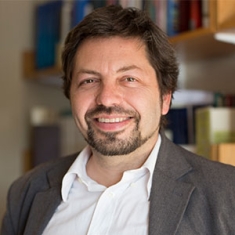
The Rutgers School of Public Health has launched a 100% online Master of Public Health (MPH) degree in Sexual and Reproductive Health, Rights and Justice, and is accepting students for the Fall 2026 semester.
Rutgers School of Public Health Faculty Named Endowed Professor and Inaugural Chair
The Rutgers University Board of Governors appointed Emily S. Barrett to the George G. Rhoads Endowed Legacy Professorship in recognition of her research on the early origins of health and disease and how exposures early in life shape human health and developmental trajectories.
“This is a particularly special honor for me given Dr. Rhoads’ reputation as a pioneer in environmental epidemiology and maternal-child health,” said Barrett. “Following in his footsteps, I seek to improve children’s environmental health through high-quality, impactful research as well as a commitment to training the next generation of public health leaders at Rutgers.”
An exceptional scholar and prominent epidemiologist, Barrett is a professor and vice chair of the Department of Biostatistics and Epidemiology at the Rutgers School of Public Health. She is also a member of the Environmental and Occupational Health Sciences Institute, where she codirects the Maternal-Child Environmental Health Lab and the Human Exposures and Outcomes Research Core.

“Dr. Emily Barrett is an exceptional scholar, epidemiologist, and community advocate,” said Perry N. Halkitis, dean of the Rutgers School of Public Health and Hunterdon Professor of Public Health and Health Equity. “Her work – which lives on the hyphen of theory and practice – recognizes the importance of taking, gathering, and developing knowledge and translating it to improve the health of people and populations. She is also an exceptional teacher, who has led our epidemiology concentration with sophistication and dedication. For these and many other reasons, Dr. Barrett honors the legacy of Dr. George G. Rhoads."
Barrett has published more than 190 scientific papers and book chapters and served as an editorial board member and guest or associate editor for several scholarly journals. She holds an impressive record of sustained funding over the past decade from multiple National Institutes of Health programs and has served as a principal investigator on five R01 and two U series grants.
Barrett received an A.B. in biology and English from Amherst College and a Ph.D. in biological anthropology from Harvard University. She completed a post-doctoral fellowship at the University of California-Los Angeles. Before coming to Rutgers, she was on the faculty at the University of Rochester.
The George G. Rhoads Endowed Legacy Professorship was generously funded by a gift from George Grant Rhoads and matching funds from the RBHS Legacy Professorship Match Campaign to create a professorship honoring Dr. Rhoads’ legacy at Rutgers, and to support epidemiology research within the Rutgers School of Public Health.
The Rutgers Board of Governors appointed Nir Eyal, a bioethicist whose renowned work in population-level bioethics focuses on health inequalities, health promotion, and research ethics, as the first holder of the Dr. and Mrs. Stanley S. Bergen Jr. Chair in Biomedical Ethics.

In his research, Eyal, director of the Center for Population-Level Bioethics in the Institute for Health, Health Care Policy, and Aging Research, addresses bioethical issues arising from the COVID-19 pandemic, as well as health care rationing in resource-poor settings, critical health-worker shortages, disaster response, universal health coverage and ethics in HIV and emerging-infection trials.
The endowed chair was created to honor, retain or recruit eminent scholars in the field of biomedical ethics for service on the faculty with proceeds from a life insurance policy for Dr. Stanley S. Bergen Jr., the former longtime president of the University of Medicine and Dentistry of New Jersey.
Eyal arrived at Rutgers in 2019, after 13 years on the faculty of the Harvard T. H. Chan School of Public Health and Harvard Medical School, as the Henry Rutgers Professor of Bioethics in the School of Public Health. He is the founding director of the Center for Population-Level Bioethics, which is dedicated to questions in ethics and health that arise in public policy.
He is the coeditor of the Oxford University Press series Population-Level Bioethics and has received multiple National Institutes of Health awards. He has authored more than 100 peer-reviewed papers and has earned support for his research from agencies such as the National Science Foundation and from foundations such as Open Philanthropy.
Eyal’s appointment begins July 1, 2024.